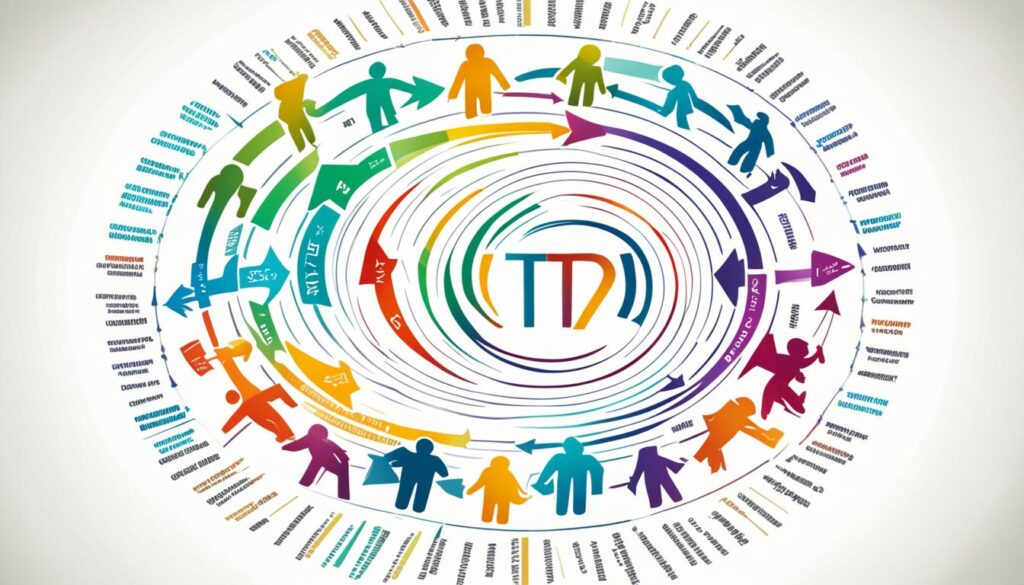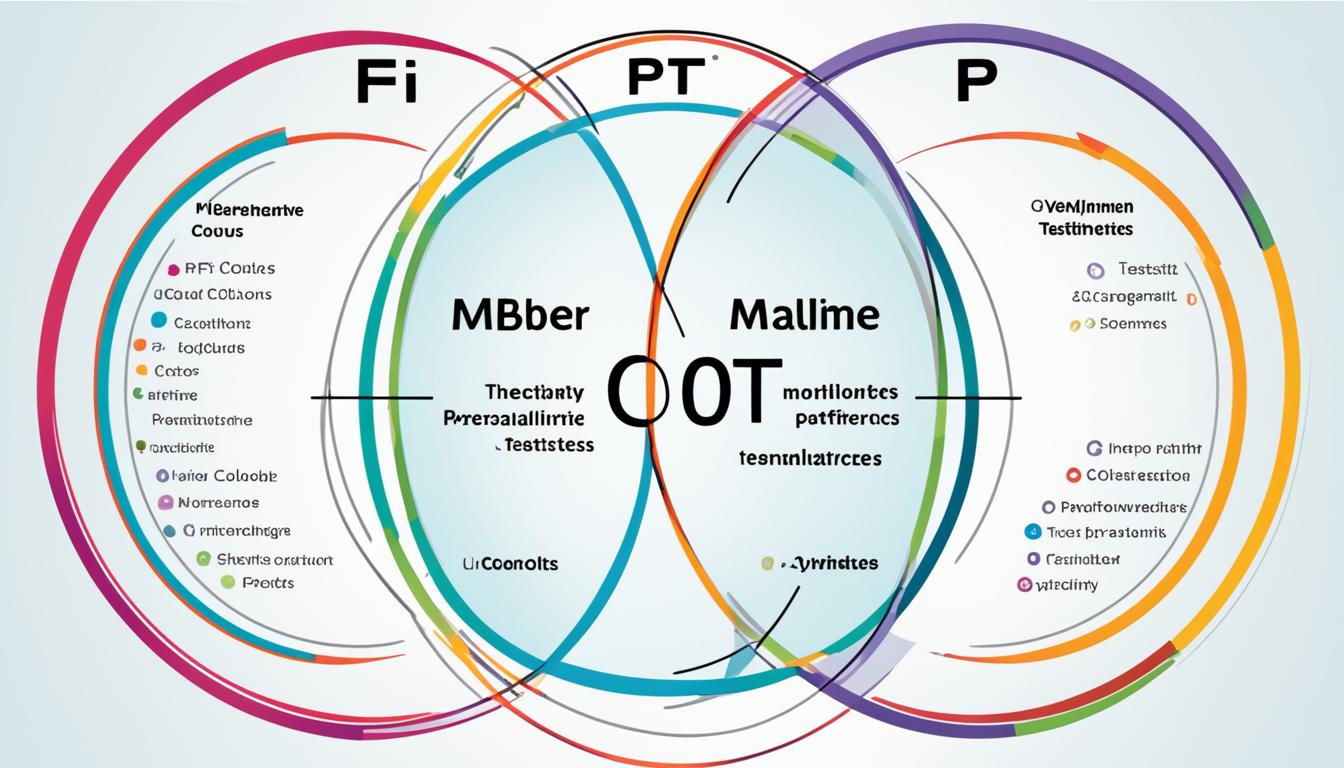Creating well-rounded characters is a major challenge for screenwriters. Developing characters with depth and authenticity can be difficult, making it hard for audiences to connect with them. However, imagine if there was a powerful tool that could assist you in crafting compelling and multi-dimensional characters.
Introducing the Myers-Briggs Type Indicator (MBTI) story template. This innovative approach leverages the insights from the popular personality quiz to create characters with diverse personalities, motivations, and growth arcs. By using the MBTI framework, you can bring your characters to life and captivate your audience with their journeys.
Key Takeaways:
- MBTI can be a valuable resource for screenwriters in creating three-dimensional characters.
- The MBTI assessment assigns individuals one of sixteen possible “psychological types” based on their preferences.
- Understanding the MBTI categories allows writers to build complex and dynamic characters.
- Using MBTI can help in creating conflict, growth, and character arcs in your script.
- By aligning your character’s MBTI type with their desires, fears, and motivations, you can create compelling and authentic character arcs.
What is Myers-Briggs?
Myers-Briggs is a personality assessment based on the work of psychologist Carl Jung. It assigns individuals one of sixteen possible “psychological types” based on their preferences for extroversion/introversion, sensing/intuition, thinking/feeling, and judging/perceiving. This assessment can help writers create more realistic and well-rounded characters by understanding their personality traits.
Understanding the Myers-Briggs Type Indicator (MBTI) can be a valuable tool for screenwriters looking to develop compelling characters in their stories. By incorporating the MBTI personality types into story creation, writers can create more nuanced and authentic characters that resonate with their audience.
“The power of the MBTI lies in its ability to provide insights into the unique preferences and tendencies of individuals.”
With the MBTI, writers can go beyond superficial character descriptions and delve deeper into the motivations, behaviors, and thought processes of their characters. This understanding allows for the creation of well-rounded characters who feel believable and relatable to audiences.
By utilizing story templates based on MBTI personality types, writers can structure their narratives to align with the characteristics and traits of their characters. This not only helps in creating a consistent and coherent story but also adds depth and complexity to the character arcs.
By incorporating the insights provided by the MBTI assessment, writers can create characters that are true to life and resonate with readers or viewers. The next section will explore the different MBTI categories and how they can be used to further enhance story development.
Understanding the MBTI Categories
The MBTI categories encompass various aspects of an individual’s personality, allowing writers to develop complex and dynamic characters. These categories provide insight into how a person interacts with the world, processes information, makes decisions, and structures their external environment.
The first category is extroversion/introversion, which determines how a character engages with the world around them. An extroverted character may thrive in social settings and draw energy from interacting with others, while an introverted character may prefer solitude and need time alone to recharge.
The sensing/intuition category sheds light on how characters process information internally. Sensing characters rely on concrete facts and details, preferring practicality and realism. On the other hand, intuitive characters tend to focus on possibilities, patterns, and underlying meanings, allowing them to see the bigger picture.
The thinking/feeling category determines how characters make decisions. Thinking characters base their decisions on logic and objective analysis, prioritizing fairness and consistency. Feeling characters, on the other hand, prioritize empathy, values, and the impact on others when making choices.
The final category, judging/perceiving, showcases how characters prefer to structure their external world. Characters with a judging preference tend to be structured, organized, and enjoy making plans. In contrast, characters with a perceiving preference embrace flexibility, adapting to new circumstances and exploring multiple options.
Using the MBTI Categories in Character Development
The MBTI categories serve as a valuable tool in creating multi-dimensional characters. By understanding how these categories shape a character’s personality, writers can craft nuanced and realistic portrayals that resonate with audiences.
For instance, a character with an extroverted and intuitive personality may be adventurous, craving excitement, and seeking new experiences. This combination of traits can lead to compelling storylines centered around exploration and discovery.
On the other hand, a character with an introverted and sensing personality may have a keen eye for detail and a preference for practicality. This character’s story could revolve around problem-solving and meticulous planning, providing a different perspective and unique set of challenges.
By considering each category and its influence on a character’s behavior, writers can create dynamic and realistic storylines that engage readers or viewers.

Using MBTI in Screenwriting
MBTI can be a powerful tool for developing three-dimensional characters in screenwriting. By understanding the different personality types and their characteristics, we can create more authentic and relatable characters. One effective way to utilize MBTI is by taking a free assessment from our character’s point of view. This allows us to gain insights into their preferences and thought processes, enabling us to craft more compelling and realistic storylines.
Furthermore, exploring the MBTI results of famous fictional and real-life people can provide valuable inspiration for character development. By studying the personality types of well-known individuals, we can gain a deeper understanding of how certain traits manifest in various situations. This knowledge can help us create more nuanced and relatable characters.
Evaluating the MBTI results of our ensemble cast can also reveal missed opportunities for conflict and dynamic relationships. By analyzing the compatibility and differences between characters’ personality types, we can enhance the depth and complexity of their interactions. This can lead to more engaging and realistic storytelling.
Example:
“She’s an extroverted feeler, and he’s an introverted thinker. Their contrasting personality types provide ample opportunity for conflict, as they approach problems and make decisions from different perspectives. Their divergent outlooks create tension and challenges that propel the storyline forward, adding depth and intrigue to their relationship.”
To further illustrate the impact of MBTI in screenwriting, let’s take a look at a table comparing the personality types of two iconic fictional characters:
| Character | MBTI Type |
|---|---|
| Harry Potter | ISFP |
| Hermione Granger | INTJ |
Comparing the MBTI types of Harry Potter and Hermione Granger, we can see their contrasting traits and how they contribute to their respective character arcs. Harry’s ISFP type reflects his sensitivity, adaptability, and desire for personal freedom, which are evident as he navigates the challenges of the wizarding world. Hermione’s INTJ type, on the other hand, highlights her logical thinking, strategic planning, and inclination toward independence, driving her relentless pursuit of knowledge and advocacy for justice.
By leveraging the insights provided by MBTI, we can infuse our stories with dynamic characters who resonate with audiences and create memorable narrative arcs.

Taking the MBTI Assessment
To effectively utilize MBTI as a powerful screenwriting tool, immerse yourself in your character’s world by taking the assessment from their perspective. This involves answering the MBTI questions as though you were the character, allowing you to gain deep insights into their preferences and behavior.
By stepping into your character’s shoes, you can develop a profound understanding of their motivations and decisions. This knowledge will enable you to craft an authentic and multi-dimensional character, enhancing the believability and relatability of your story.
Remember, the MBTI assessment should be approached as an exploration of your character’s psyche, acting as a window into their unique perspective.
Moreover, the results of the assessment can serve as valuable writing prompts and templates to guide the trajectory of your character’s story arc. The MBTI assessment outlines the strengths, weaknesses, and distinct traits associated with each personality type, providing you with a rich foundation from which to shape your character’s journey.
With this newfound understanding and the aid of MBTI writing prompts and templates, you can delvedeeper into your character’s personality type and create a story that is true to their nature.
Example:
Let’s say your character is an introverted artist who seeks solitary creative experiences. By taking the MBTI assessment from their perspective, you may discover that they have a preference for intuitive thinking (INTP). Armed with this knowledge, you can design a story template that aligns with the unique traits and challenges of this personality type. Your character’s story arc may revolve around their struggle to balance their need for solitude with external pressures that demand their engagement with the world.
Based on the MBTI assessment results, you can tailor their story to incorporate the templates and prompts provided for their specific personality type. This approach will help you infuse authenticity and depth into their character, creating a captivating narrative that resonates with your audience.

Next, we’ll explore how to gain a deeper understanding of your characters by analyzing their individual MBTI type in more detail.
Getting to Know Your Characters
Once you have determined your character’s MBTI type, it’s time to dive deeper into their personality profile. This step is crucial in developing well-rounded and authentic characters. Lucky for us, there are numerous resources available that provide detailed descriptions and insights into each MBTI type.
These resources can help us better understand our characters’ strengths, weaknesses, and motivations. By delving into the specifics of each personality type, we can gain valuable insights into how our characters are likely to behave, react, and make decisions. This deeper understanding allows us to create more realistic and relatable characters.
Furthermore, studying the MBTI types of our favorite fictional and real-life people can provide further inspiration and guidance for character development. We can draw inspiration from their personalities, traits, and experiences to add depth and complexity to our own characters.
“Getting to know your characters on a deeper level is like unlocking a treasure trove of storytelling possibilities. Embrace the insights offered by MBTI and watch your characters come alive.”
Exploring MBTI Descriptions
To get started, explore the detailed descriptions of each MBTI type. These descriptions typically cover a wide range of aspects, including how each type interacts with others, processes information, makes decisions, and organizes their external world. By studying these descriptions, we can gain a better understanding of the unique qualities and tendencies associated with each type.
As you explore, pay attention to the strengths, weaknesses, and common motivations for each type. These insights can help you shape your characters’ behaviors, goals, and conflicts. Remember, no character is perfect, and understanding their vulnerabilities and limitations is key to creating compelling story arcs.
Learning from Real-life and Fictional Examples
Don’t limit yourself to just the descriptions! Take the time to analyze the MBTI types of your favorite fictional characters and real-life personalities. Look for patterns and connections between their personalities and their actions or decisions. This analysis can provide valuable inspiration and guidance when developing your own characters.
For example, if you’re working on a character who shares an MBTI type with a renowned historical figure, you can explore their life experiences and accomplishments to draw inspiration for your character’s strengths and achievements. Alternatively, if you’re crafting a villainous character, studying the MBTI types of iconic fictional villains can help you shape their dark side and motivations.
Visual Inspiration
Let’s take a moment to feast our eyes on an image related to character development and MBTI. This image captures the essence of exploring different personality types and can further ignite our creative process:

Putting It All Together
By combining the insights gained from MBTI descriptions, real-life and fictional examples, and your own imagination, you can create fully-formed characters that resonate with your audience. Remember to consider how your characters’ personality traits influence their relationships, goals, and conflicts. Embrace the power of MBTI in character development, and you’ll have the tools to craft compelling and authentic stories that captivate your audience.
| Benefits of Getting to Know Your Characters | Benefits of Exploring MBTI Descriptions |
|---|---|
|
|
Using MBTI to Create Conflict and Growth
One of the greatest advantages of incorporating the Myers-Briggs Type Indicator (MBTI) in screenwriting is its ability to generate conflict and spur character growth. By understanding the dynamic interplay between different personality types, screenwriters can develop intricate relationships and conflicts within their storylines. This results in character arcs that are not only engaging but also realistic.
When crafting characters based on MBTI, it is essential to consider the strengths and weaknesses associated with each personality type. By leveraging these inherent qualities, writers can create relatable and compelling character journeys that resonate with audiences.
For instance, when contrasting two characters of different MBTI types, their conflicting traits can spark captivating conflicts that fuel the story’s momentum. The clash between an extroverted, spontaneous character and an introverted, methodical character can lead to a dramatic confrontation that drives the plot forward.
Creating Complex Relationships
The interactions between divergent personality types also pave the way for complex relationships. These dynamics add depth and realism to your characters’ interactions, enhancing the overall quality of your story. By exploring the connections between different MBTI types, you can introduce dynamic and meaningful bonds.
For example, a character with a perceiving personality type may find themselves constantly at odds with a character who possesses a judging personality type. Through the ensuing conflicts, these characters can experience personal growth and develop a mutual understanding that transforms their relationship.
Facilitating Character Growth
MBTI can also serve as a catalyst for character development and growth. As the story progresses, you can challenge your characters by placing them in situations that push the boundaries of their established personalities.
By introducing conflicts that target their weaknesses, you enable your characters to confront their flaws and evolve. This growth not only enriches the narrative but also provides a meaningful and satisfying character arc for your audience.
Using MBTI in screenwriting allows us to create character conflicts that are both compelling and realistic. By understanding the type dynamics between different personality types, we can craft intricate relationships and thought-provoking story arcs that captivate audiences.

By utilizing MBTI to shape conflict and growth, you can infuse your screenplays with authenticity and depth. In the next section, we will delve into the process of developing character arcs using MBTI as a guide.
Developing Character Arcs with MBTI
MBTI can serve as a valuable guide for developing character arcs in your story. Each personality type possesses unique strengths and weaknesses that significantly influence how a character navigates challenges and undergoes growth throughout the narrative.
By aligning your character’s MBTI type with their desires, fears, and motivations, you can create a character arc that is not only compelling but also authentic and relatable. Incorporating their personality traits into their journey allows for a deeper exploration of their inner conflicts and personal development.
Understanding the archetypal story roles associated with each MBTI type provides further guidance in shaping your character’s arc. By studying famous examples of characters with similar personality types, you gain inspiration and insight into how their arcs can unfold. This knowledge allows you to craft well-rounded character development that resonates with your audience.
“The MBTI approach equips us with a roadmap to understand how our character’s personality traits can shape their journey, allowing for intriguing character arcs that evoke emotion and engage readers or viewers.” – Writer’s Insight
MBTI Archetypal Story Roles
Much like the concept of “the hero’s journey,” MBTI archetypal story roles provide a blueprint for character development. These roles provide guidance on how your character can interact with others and contribute to the overall narrative.
Here is an example table showcasing the MBTI archetypal story roles:
| MBTI Type | Archetypal Role |
|---|---|
| ISTP | The Explorer |
| ENFP | The Advocate |
| INTJ | The Strategist |

Developing character arcs with MBTI allows you to tap into the depths of your character’s personality, driving their growth and transforming them into dynamic individuals within your story.
- Align your character’s MBTI type with their desires, fears, and motivations.
- Study the archetypal story roles associated with each MBTI type.
- Find inspiration from famous examples with similar personality types.
By implementing MBTI as a tool in your storytelling process, you can create characters with rich and transformative arcs that captivate the hearts and minds of your audience.
Conclusion
MBTI offers a valuable tool for screenwriters to create engaging and multi-dimensional characters. By understanding the different personality types and their characteristics, writers can develop more authentic and relatable characters. Each personality type brings a unique set of strengths, weaknesses, and motivations that can shape the character’s story arc.
Using MBTI as a framework for character development allows writers to craft compelling storylines, conflicts, and character growth. By incorporating the insights gained from MBTI assessments and studying the MBTI types of real-life and fictional individuals, writers can infuse their characters with depth and authenticity.
With MBTI-inspired story templates and the guidance of the personality type story template, writers can bring their characters to life and create stories that resonate with audiences. By utilizing the power of MBTI in their writing process, screenwriters can craft more believable characters and drive captivating narratives.
FAQ
What is the Myers-Briggs Type Indicator (MBTI)?
The Myers-Briggs Type Indicator (MBTI) is a popular personality quiz that assigns individuals one of sixteen possible “psychological types” based on their preferences for extroversion/introversion, sensing/intuition, thinking/feeling, and judging/perceiving.
How can MBTI be used in screenwriting?
MBTI can be used as a powerful resource in screenwriting to create three-dimensional characters by understanding their personality traits. It can help writers develop complex relationships, conflicts, and character arcs within their stories.
How can I take the MBTI assessment from my character’s perspective?
To take the MBTI assessment from your character’s point of view, answer the questions as though you were them. This can provide insight into their preferences, thought processes, and motivations.
Where can I find resources to understand each MBTI type in more depth?
There are many resources available that provide descriptions and insights into each MBTI type. These resources can help you understand your character’s strengths, weaknesses, and motivations.
How can MBTI help in creating conflict and promoting character growth?
By understanding the type dynamics and interactions between different personality types, you can develop complex relationships and conflicts within your story. This can lead to more interesting and realistic character arcs.
How can MBTI be used to develop character arcs?
Each personality type has its own strengths and weaknesses, which can influence how a character navigates challenges and grows throughout the story. By aligning your character’s MBTI type with their desires, fears, and motivations, you can create a compelling character arc.
How can I incorporate MBTI into my writing process?
Use MBTI as a framework for character development by taking your character’s MBTI type into consideration. This can help you create more authentic and relatable characters.
How can MBTI enhance the depth and authenticity of my characters?
By understanding the different personality types and their characteristics, you can develop more authentic and relatable characters. Incorporating MBTI into your writing process can bring your characters to life with depth and authenticity.
What are the benefits of using MBTI in screenwriting?
Using MBTI as a tool in screenwriting can help you create engaging and multi-dimensional characters. It can lead to more compelling storylines, conflicts, and character arcs.









